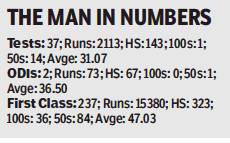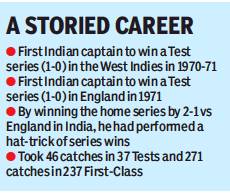Ajit Wadekar
This is a collection of articles archived for the excellence of their content. |
Contents |
A brief biography

From: Captain For The Ages: First To Lead India To Series Wins In England, WI, August 16, 2018: The Times of India
The 77-year-old served Indian cricket in various capacities. It was during his tenure as captain that India won their first-ever Test series in West Indies and England in 1971. He is survived by wife Rekha and a son and a daughter who have both settled down abroad.
The left-handed Wadekar, who made his debut in 1966 in Mumbai against West Indies, went on to play 31 Tests, scoring one hundred and 14 fifties before calling it quits in 1974. Interestingly, it was former India captain Vijay Merchant’s casting vote as chairman of the selection committee which ended MAK Pataudi’s long reign as India captain and handed over the reins to Wadekar in January 1971.
After being away from the sport for some time, Wadekar was appointed as the coach for India’s historic tour of South Africa in 1992. He formed a formidable partnership with captain Mohammad Azharuddin especially at home and later played an instrumental role in turning Sachin Tendulkar’s career by making the batting maestro open the innings in One-Day Internationals during the tour of New Zealand in 1994.
Tendulkar never looked back after that and went on to corner all batting records and emerged as one of the game’s greatest ever batsmen. Azharuddin told TOI that Wadekar’s demise was a personal loss for him. “He was an outstanding player and captain and one of the best human beings.”
Wadekar quit as the coach after India exited the 1996 World Cup at the semifinal stage after losing to Sri Lanka in Kolkata. He later also served as the chairman of selectors, and briefly dabbled in cricket administration as he took on the might of Sharad Pawar and contested the Mumbai Cricket Association polls for president in 2001. “The sun goes down on another legend and my all-time favourite cricketer. By far he was one of the most popular cricketers of the 60s. His contribution to Mumbai and India as a captain and as a stylish batsman, is huge. His team of 1971 was mainly responsible to set a winning trend for Indian cricket abroad,” former India skipper Dilip Vengsarkar, who was a neighbour of Wadekar, said.
Former India skipper Sourav Ganguly too expressed shock. “I will miss him very much. He was very dear to me. It's a sad day.” Legendary left-arm-spinner Bishan Singh Bedi, who was part of Wadekar’s twin triumphs in England and West Indies, tweeted, “Very sad news of Ajit Wadekar passing away. The only Indian captain to win three series in a row, two away and one at home. Ajit Wadekar was a good contemporary.”
Achievements

Tests,
ODIs,
First Class
From: Captain For The Ages: First To Lead India To Series Wins In England, WI, August 16, 2018: The Times of India

a storied career
From: Captain For The Ages: First To Lead India To Series Wins In England, WI, August 16, 2018: The Times of India
See graphics:
1. Ajit Wadekar, in numbers-
Tests,
ODIs,
First Class
2. Ajit Wadekar-
a storied career
Tributes
Bedi on Wadekar, the mentor
Bishan Singh Bedi, Ajit had the vital Midas touch, August 17, 2018: The Times of India
All of us cricketers from Delhi and North Zone are grateful to the late Ajit Laxman Wadekar for inadvertently passing on Bombay’s (as it was called then) fighting qualities to us.
Not terribly deliberately, of course, but when we were contemporaries — playing for and against each other — I would like to think that my personal belief in Delhi and North Zone went up manifold by rubbing shoulders with India’s finest left-handed batsman of our times.
Ajit Wadekar was the most affable Bombay player in the Indian dressing room. When we toured England in ’67 and then Australia and New Zealand in ’68 and ’69, Ramesh Saxena and myself would often talk about Ajit with growing fondness.
Subsequently, Hanumant Singh joined our exclusive club of ALW admirers. I think our State Bank of India comradeship was fairly chirpy and helpful, till a casting vote transported Ajit to the realms of Indian captaincy. It all appeared to have happened pretty rapidly. I’m not very sure if Ajit himself was prepared for the moment, but he grabbed it with both hands.
Much to the delight of Indian cricket, Ajit had the vital Midas touch to go on and record historic first-ever Test series wins in the Caribbean and then in England, followed by a home Test series victory against England. It all happened briskly enough to make Indian fans and the media — quite oblivious to some of the ingrained shortcomings that our team might have had at that time — simply delirious.
Well, come the ’74 tour of England, we were thoroughly exposed. Indians have seldom taken defeat kindly, so it was to be Ajit Wadekar’s turn for a sudden exit from international cricket when honestly he still had much more to offer, as a player if not as captain.
Much as I admired Ajit’s batting, and cricketing prowess, I reckon he allowed too many intrigues of the Indian cricket board (BCCI) to overpower him. A genuinely good and honest cricket soul was made to bite the dust way ahead of his time.
Even so, the hattrick of series wins under his captaincy was the hallmark of his career. Till today, the BCCI has not felt the need to honour the Wadekar-led team which won three series in a row. This is one debate we would often indulge in, and only end up making Ajit more irksome!
Whenever we clashed on the domestic scene, we were staunch enemies. It may have had something to do with my personal envy of Bombay’s great cricket culture. We tried to emulate them, but only just! Thanks to men like Ajit Wadekar, Bombay’s cricket roots run very deep and will continue to bear fruit.
Ajit missed the MAK Pataudi Lecture in Bengaluru, and I sensed something was amiss. He would WhatsApp regularly, but soon that stopped. My apprehensions grew when at the last moment he withdrew from our ‘Tribute to Tiger’ cricket night in Delhi. Well let’s face it, we are in the ‘mandatory overs’ of our lives and there is no DRS facility available. Rest in peace, Ajit Laxman Wadekar. You have done India proud.
(Former India captain Bishan Singh Bedi and Ajit Wadekar both made their India debut in the 1966 series against the West Indies at home)
Gavaskar on Wadekar’s career
Sunil Gavaskar, My captain always, August 17, 2018: The Times of India
Sunil, sorry, he is no more.” Those devastating words conveyed to me that ‘my captain’ Ajit Wadekar had passed away. Just a while earlier, I was trying to help put him in the car to rush him to hospital, since the ambulance was going to take another 15 minutes to arrive. It was a hopeless battle.
Ajit Wadekar was my captain when I made my debut for Mumbai in the Ranji Trophy and he was my skipper when I got my India cap. So for me he was always ‘captain’. That he was from Shiva-ji Park Gymkhana and I was from Dadar Union Sporting Club, its great rival, then made no difference as I was a fan first. Those days there was hardly a single weekend where you didn’t read about Wadekar getting a century.
To many it was a surprise that he made his India debut as late as 1966 against Garry Sobers’ West Indies team. Five years later, it was against Sobers’ team that he led India for the first time and went on to win the series, beating West Indies for the first time. A couple of months after that he led India to another historic win, in England.
He was unkindly called a lucky captain by those who couldn’t stomach the fact that he had replaced the charismatic Pataudi. The then chairman of selectors, Vijay Merchant, was also pilloried for it was his casting vote that made Wadekar the new Indian captain then. Even after these twin wins and another in India a year later, neither Vijay Merchant nor Ajit Wadekar got the credit they deserved for those hat-trick of wins.
Ajit retired from Test cricket suddenly when he was left out of the West Zone team for the Duleep Trophy by a committee led by another Indian great, Polly Umrigar, and concentrated on his banking career and also cricket administration. He also was a successful manager of the Indian team in the early ’90s.
There's hardly been a day when I haven’t mimicked his ‘arre kay re‘ at least once, and not just me but even Sachin Tendulkar told me that he too says the same at least once a day.
My captain is no more but he will always be with me when I say, ‘arre kay re'. RIP, captain.